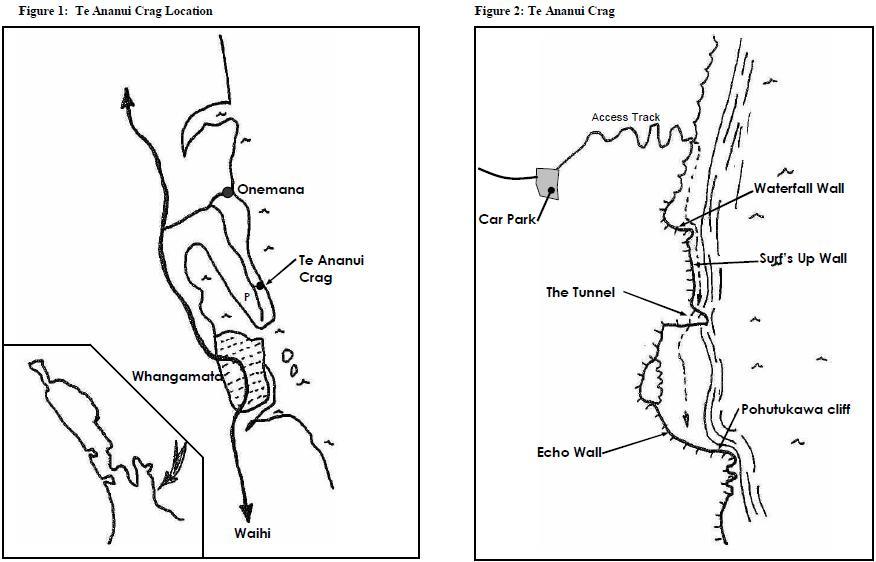The rock at Te Ananui is rhyolite, typically horizontally banded and vertically jointed, which makes for extremely positive holds and cracks that provide sound placements. The rock quality is variable: in general where the rock is white, it has weathered to a sandy, often salt encrusted and rounded form. Some routes have gone on this rock, but as a best bet for the newcomer, it should be avoided!
There is a great deal of extremely solid rock, which is typically orange or yellow in colour. Most of the good routes follow cracks and seams on this rock, which is usually close to vertical. There are an abundance of positive holds, so that grades tend to group around 16-18, although most are fairly strenuous. Having raved about how solid the rock is, take care since many of the routes have only been climbed once or twice, and there will be the odd loose rock. It's a very good idea for the belayer, if not the leader as well, to wear a helmet, and to stack the rope somewhere safe.
Jo Haines spotted the cracklines on Pohutukawa cliff in September 1991 and on a subsequent visit with Dave Campbell they put up five routes in an afternoon. These two were responsible for most of the early routes. Various other climbers visited the beach during the summer, and in particular Mark Jones and Ray Hollingsworth added an impressive string of routes.
Access to the top of the cliffs is difficult, so there is little here for the top-roping climber. If you want to climb, bring your rack! There is good bouldering, especially on Echo wall, with good landings on soft sand.
Gear
To climb at Te Ananui you'll need a range of cams and wires of all sizes. Hexes even come in handy. Flexible camming units are especially handy as there are lots of deep horizontal breaks. RP's have even been used on Echo wall where the tight seams allow good placements (although you'll probably need to convince yourself of that!). Slings are needed for runners around trees.
Of the nearly 70 routes at Te Ananui, only a handful use bolts for protection. It would be nice to see this ratio of bolts to natural pro. remain.
The gear you will need - a full rack of cams and wires plus hexes if you have them, and 11 quickdraws.
Te Ananui is 12 km by road from Whangamata on the Coromandel Peninsula. Five km north of Whangamata turn right to Onemana, then at the top of the hill take the private road right for 5 km until you reach a small carpark in the forest, 500m past the last paddocks. From here the track leads off along a ridge, then down a steep gully to the beach. The first cliffs are 100 m to the right. Walking past these you'll get to a small tunnel leading to a completely enclosed little beach where most of the route development to date has taken place. There is no camping allowed in the forest, and a sign on the gate says the gate is locked at 7pm, it isn’t always closed but I know of at least one group that has been locked in. There is no fresh water at the beach for most of the year.
Through the tunnel, you find yourself on a beautiful secluded little beach surrounded by tall cliffs draped by Pohutukawa trees. Just before you tear off your clothes and rush into the sea, check out the crags here. On your immediate right and above you is Cheddar Master's Choice. At the far end of the beach is a cliff which juts out into the sea with prominent cracklines, and a cave. This is Pohutukawa Cliff. Along the cliff to the right is a white expanse of rock called Scunge Wall (for obvious reasons). This merges into a high steep cliff of beautiful orange rock with thin cracklines called Echo Wall, home of some of the best Te Ananui routes. Partly hidden by trees is Yellow Brick Road Wall.
